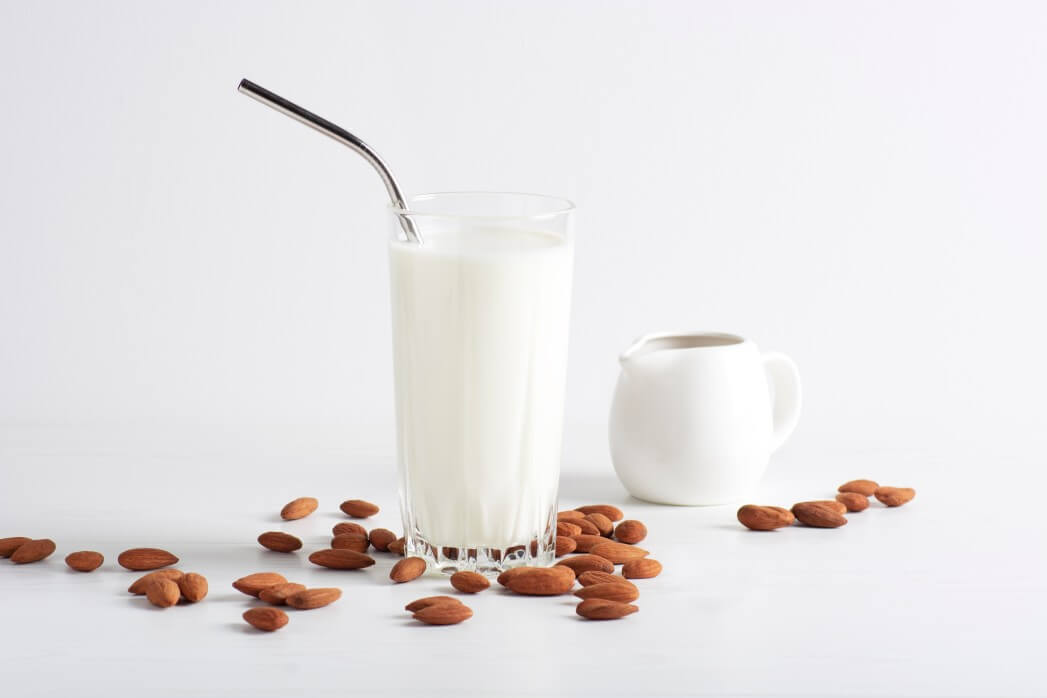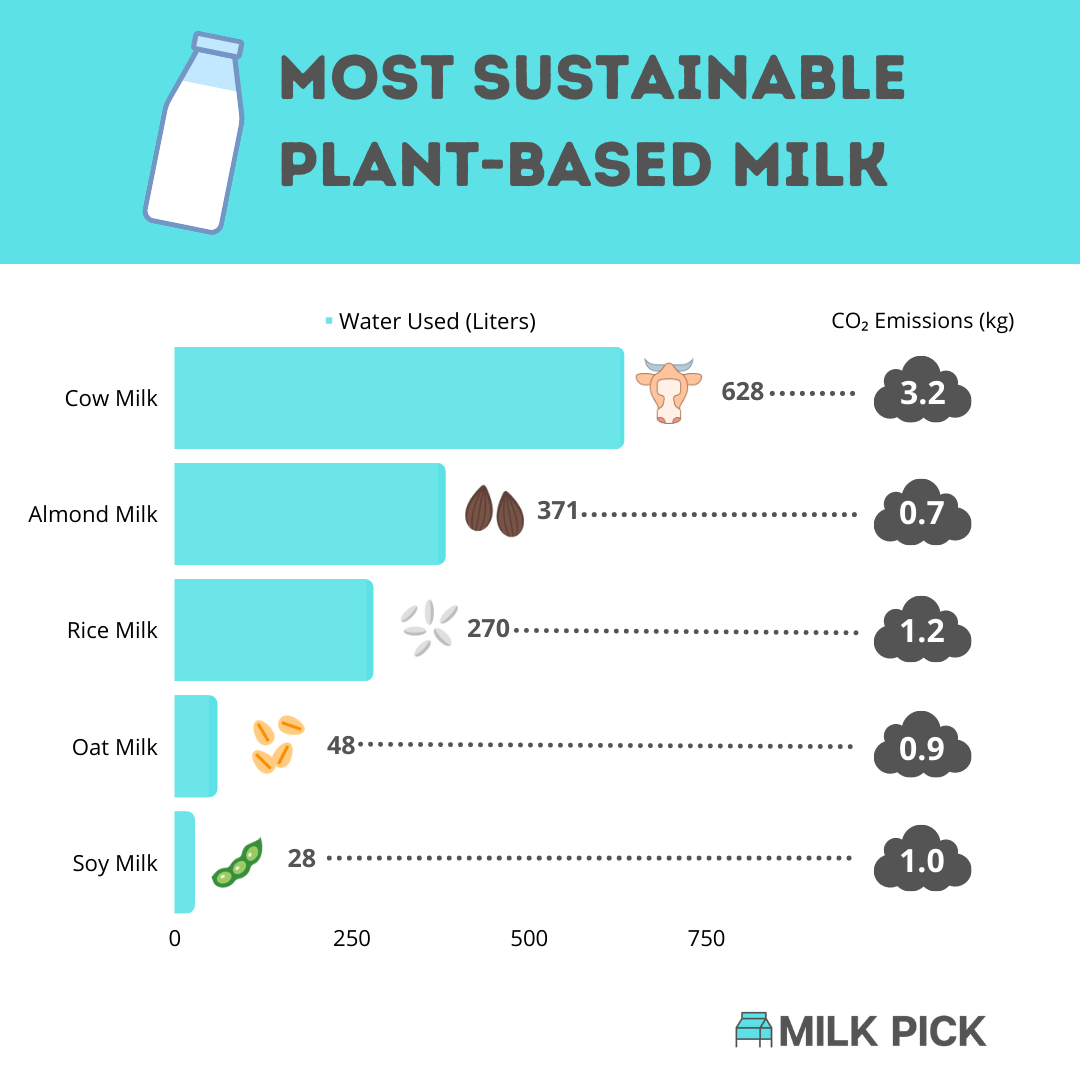Almond Milk vs. Cashew Milk
Almond milk and cashew milk are two of the most popular non-dairy milk options available and very similar. But which is the right option for you?
Almond milk and cashew milk are two of the most popular non-dairy milk options available and very similar. But which is the right option for you?
Over the years, plant-based milk — and especially nut-based milks like cashew milk or almond milk — have grown in popularity with no signs of slowing down.
With cashew and almond milk being two of the most popular options, which one is the better choice?
Nutritionally speaking, cashew milk and almond milk are quite similar. The test then boils down to factors like taste and versatility, price, and environmental impact.
Whether you’re vegan, environmentally conscious, lactose intolerant or simply prefer the taste, plant-based milk has seen a sharp rise in popularity over the past few years.
In this article we’ll dive deeper into a comparison between cashew milk and almond milk specifically and how to decide which one is right for you.
When it comes to making cashew milk or almond milk, the process is roughly the same for both whether made at home or in the factory.
The nuts are soaked until they are soft and then they are blended with water. Any leftover solids are removed and flavoring or sweeteners added.
If this milk is homemade, it will typically contain higher amounts of protein, fats and minerals but it will still need to be fortified with calcium.
This is a simple enough task by adding either a powder or liquid form of calcium and Vitamin D.
Commercially produced cashew or almond milk follows the same process above, but on a much larger scale.
In addition, preservatives, thickeners and stabilizers may be added to fortify the milk with nutrients as these are diluted in the process.
If you're purchasing milk from the store, look for products with little to no additives aside from any added vitamins and nutrients. If you don't want the added nutrients however, making your own cashew or almond milk is the way to go.
As you’ll see in the table below, there are no major differences between cashew milk and almond milk when it comes to nutrition.
Almond milk is slightly higher in fiber and fat — but very marginally.
Cashew milk on the other hand, contains less sugar and calories.
If you’re doing your own comparison, remember to compare milk of the same brand, make sure they’re fortified with calcium and Vitamins A, E and D, especially if you’re not supplementing in other ways.
That’s because the store-bought versions are diluted in micronutrients as a result of the manufacturing process.
As you'll see in our video below, almond milk in particular is an excellent source of Vitamin E, a powerful antioxidant with anti-inflammatory properties.
Also opt for the unsweetened version for the healthier choice.
Sweetened cashew and almond milk include added sugars rather than natural sugars like cow’s milk does.
Added sugars contain zero nutritional value other than packing on the calories.
The below is a comparison of almond milk and cashew milk according to the USDA database:
1 Cup | Almond Milk | Cashew Milk |
|---|---|---|
Calories | 39 | 24 |
Protein | 1g | 1g |
Fat | 3g | 2g |
Carbohydrates | 4g | 2g |
Fiber | 1g | 0g |
Sugar | 2g | 0g |
Data sources: Almond milk, Cashew milk, Disclaimer about this information
This boils down to preference ultimately.
Cashew milk and almond milk are similar in taste, however quite different when it comes to texture.
Cashew milk is far creamier and has a less nutty flavor compared to almond milk — which does make it more versatile.
Many people enjoy using cashew milk for cooking and baking for this reason, and cashew milk therefore works better as a dairy-free alternative when making soups and creamy sauces (e.g. alfredo sauce) as opposed to adding to their hot drinks.
Almond milk is smoother by comparison and lighter in flavor, making it perfect for everyday drinking as opposed to cashew milk (and more palatable for most people).
Related: What Does Almond Milk Taste Like?
Because of its naturally sweeter taste, it’s also the more popular choice for sweet dishes.
Ultimately, both cashew and almond milk can be used as substitutes for cow's milk in pretty much any recipe.

It’s estimated that roughly 1% of the general population has a nut allergy with roughly 1 in 200 people being affected in some populations with the peanut allergy being the most common type of food allergy worldwide.
If you a nut allergy, unfortunately this means you should stay away from cashew and almond milk unless your physician clears it first.
As with most, if not all, plant-based / dairy-free alternatives, you can expect cashew milk and almond milk to be more expensive than regular cow’s milk with prices roughly double the cost.
Despite this, sales of plant-based milks like cashew and almond milk continue to increase each year as more people make the conscious switch.
So how do cashew milk and almond milk compare with each other?
In the table below, we compare the price of cashew milk and almond milk of three brands at three different price points.
Overall, there’s no difference in price between the two types of milk when comparing within the same brand, but almond milk is generally easier to find in the grocery store.
Brand | Cashew | Almond Milk |
|---|---|---|
Elmhurst | $0.21/fl oz | $0.22/fl oz |
Pacific Foods | $0.11/fl oz | $0.12/fl oz |
Silk | $0.05/0z | $0.04/oz |
Note: The prices above are based on pricing from Amazon.com and HEB online at the time of this writing. The price of plant-based milk varies depending on the brand and where you buy it from.
It’s evident that plant-based milk is better for the environment when taking into account the amount of greenhouse gas emissions, and use of land, machinery, grains and food.
In fact, it takes nearly three times more CO2 emissions to produce one glass of cow's milk compared to any plant-based alternatives.

But does this mean options like cashew milk or almond milk are considered a great alternative or just a slightly less worse option?
Let’s take a look at the environmental impact of the two milks in question in more detail below:
The majority of the world’s cashews are produced in India, Vietnam and Africa — and those farmed in Africa need to be transported to Vietnam or India to get processed and manufactured before they can be delivered to the various retailers around the world.
This adds to the carbon footprint, but that’s not all. Cashews, like other nuts, need a lot of water to be produced — approximately 6,450 liters to produce just 1 pound of cashews, in fact.
Don’t worry though, you can reduce the potential environmental impact in this regard by purchasing organic cashew milk instead or looking out for brands that clearly states it is ethically produced.
Perhaps the most concerning environmental factor, however, is the treatment of factory workers in India where the majority of the world’s cashews are produced.
It’s no secret that factories in India primarily use women and children to manually de-shell the nuts for very little pay.
Make sure you purchase your cashew milk from a brand that pledges workers are protected.
Most of the world’s almonds produced for milk are farmed in California. However, because of the climate they need a lot more water to be produced. As a result of the dry conditions, it consumes 7,302 liters of water per pound of almonds.
Over 23,000 acres of natural land has so far been converted into almond farms and because of groundwater depletion, some of this land is already sinking — which could have a long term impact on residents in the area who rely on groundwater as a source for drinking water.
This also has a knock on effect on the population of bees. How so?
Bees are needed to pollinate the almond trees, and the more the industry grows, the harder they need to work. It’s understood 50 billion bees were killed in a single year as a result of this industry.
These issues are further compounded by pesticide use which can contaminate the water that both humans and the bees use to drink.
In addition, some lower quality store-bought brands of almond milk contain traces of carrageenan, a stabilizer and thickening agent that result in ulcers and pose a carcinogenic risk to humans.

As we’ve seen above, cashew milk and almond milk are very similar when it comes to plant-based milk alternatives, especially in terms of nutritional value and price.
As taste is based largely on individual preferences and both can easily be used as alternatives to cow's milk during cooking or baking, the only major difference is the environmental impact.
If this is something important to you, the clear choice is cashew milk.
A slightly more sustainable and ethical choice compared to almond milk, even considering the poor conditions of the factory workers in India (simply find a brand that pledges fair trade and protection of the factory workers).